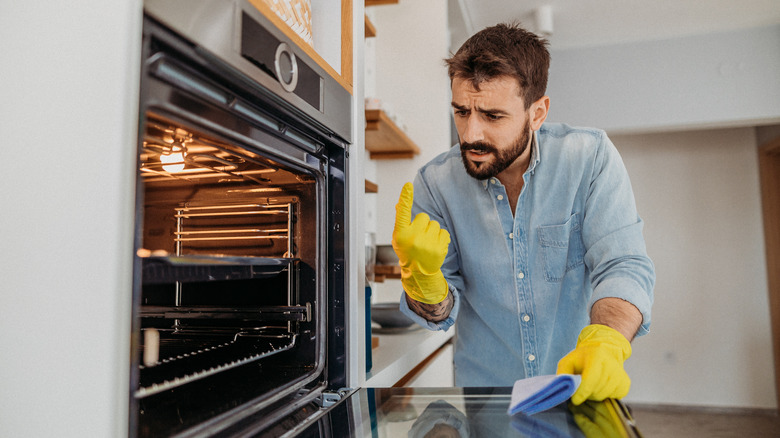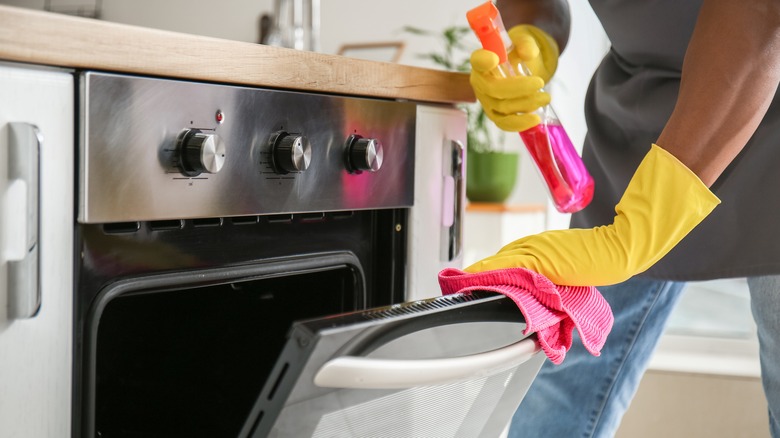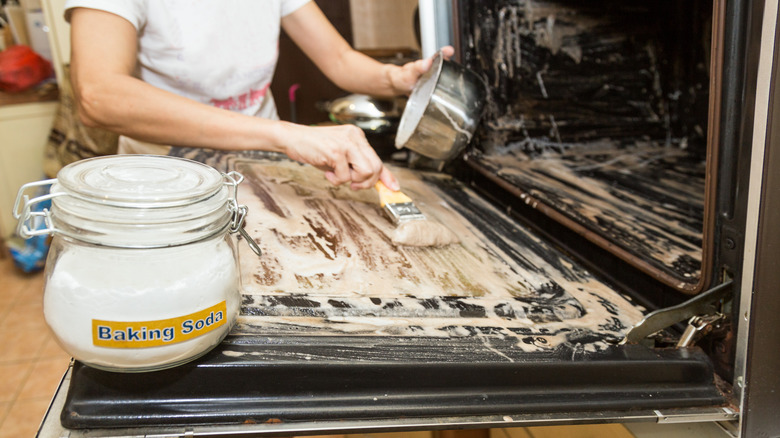Cleaning Products You Should Avoid Using On Your Oven At All Costs
When the fresh batch of cookies baking in your oven smells more like the roasted vegetables from last week's dinner, it's time to clean the oven. In fact, the appliance should be deep cleaned every three months if you use it regularly. It's not a chore you should skip. Stuck-on food can burn and cause your oven to smoke while it's in use. It can also cause odors to waft from the appliance, polluting your tasty baked dishes. Further, operating your oven while it's dirty can put a strain on the machine and possibly take years off its lifespan. However, before grabbing any cleaning spray to tackle the mess, you should know there are popular household products you should never use inside or outside your oven — bleach and ammonia.
Bleach and ammonia are common products that you might have on hand. While each has its own cleaning benefits and is suitable for other tasks around the house, you want to keep these harsh chemicals away from your oven. To avoid the dangers of grease and food build and keep the appliance running efficiently, you can reach for your favorite chemical-free oven cleaner or try DIY solutions to clean your oven naturally.
Never use bleach or ammonia on your oven
It might be tempting to use bleach to clean your oven because it is a known disinfectant that can kill bacteria. However, cleaning your oven with this popular product could end in disaster for a variety of reasons. First, bleach can discolor the finish inside your appliance and eat at the coating on the glass window. Once the lining is gone, the surface is more prone to staining. The product is also corrosive, allowing it to eat away at metals like stainless steel, copper, and nickel. Further, while bleach is a disinfectant, it is not a surface cleaner. Spraying it on or inside your oven won't remove dirt, grease, or grime.
While ammonia can tackle surface messes, it's another harsh chemical best kept away from food preparation areas. Never use bleach and ammonia together, as mixing these chemicals creates toxic gasses called chloramines. Like bleach, ammonia is corrosive and can cause respiratory issues if inhaled. Even commercial oven cleaners that contain ammonia and other harsh chemicals. These products are usually caustic, meaning they can eat away at the skin, eyes, and lining of the nose, throat, mouth, and lungs. Inhaling the fumes from these products can cause respiratory issues, and using them to clean your oven may leave chemical residue inside that can contaminate your food. You shouldn't need protective gloves and eyewear to clean your oven! Fortunately, there are methods to de-gunk the appliance without harsh chemicals.
How to clean your oven without harsh chemicals
How you really should be cleaning your oven is with natural, food-safe products. Skip the harsh chemicals and use household staples, baking soda and vinegar. A mixture of 3 parts water and 8 parts baking soda works to eliminate grease and food build-up inside the oven. Use a cloth or sponge to apply the paste inside the appliance and leave it on for 20 minutes. While the baking soda does its job, you can tackle the glass door with vinegar; simply spray and wipe as if it's a commercial glass cleaner. Once the 20 minutes are up, use vinegar to wipe off the baking soda paste.
You can also clean the oven racks without toxic products. You just need warm water and dish soap. Fill a large tray or tub with the soapy solution and let the oven racks soak for at least two hours. After their bath, use a stiff brush to clean the grates. Use a steel scour, but keep in mind that the rack is the only place you should use this abrasive tool (it is too rough and may scratch the oven's coating). Then, put the rack back, and the appliance is as good as new. Your oven should be sparkling without any harmful fumes or corrosive chemicals to worry about.


